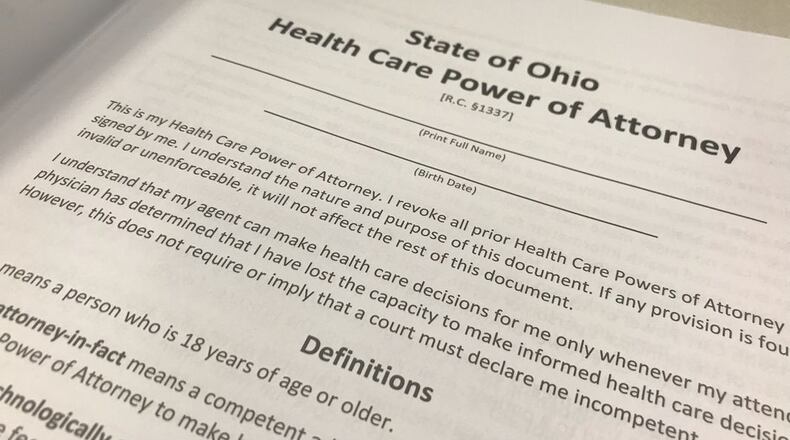Only a third of Americans have outlined an advance planning directive, a legal document that spells out end-of-life wishes. David Walsh, CEO of Hospice of Southwest Ohio, said a reason most don’t have this directive, or at minimum, a conversation with loved ones, is it’s “a very difficult and emotional conversation.”
He said it’s important to have this advance directive regardless of age or health status.
“None of us know when a future event will leave us unable to speak for ourselves, so it’s important you do it while you can before some life crisis occurs and you can’t represent what your feelings are and what you want to happen in terms of your goals of care,” Walsh said.
The top reason adults do not have an advance care directive is a lack of awareness, said Lainie Kast, Mercy Serves Program Manager with Mercy Health.
“Ohio has one of the most cumbersome advance directive packets in the United States — requiring patients to complete over 20 pages,” she said.
The coronavirus pandemic has only exasperated the problems, Kast and Walsh said.
“With contact restrictions and distancing requirements in place due to COVID-19, finding creative, safe approaches to document completion for our patients became a top priority,” Kast said.
Walsh said as hospitalizations grew rapidly as the COVID-19 pandemic progressed, “people that didn’t have the opportunity to give it much thought.”
“There wasn’t a chance to resolve that in the hospital because there were no visitors allowed, families weren’t permitted in there,” said Walsh.
Kast said with the rapid onset of COVID-19, and the life-threatening nature of the disease, that “rendered many unable to make end-of-life decisions and without expressed preferences or paperwork designating someone to make these important decisions on their behalf.”
Though the recommendation is to have their wishes spelled out, the importance for Ohioans is also growing as the state ages. Miami University Scripps Gerontology Center reports Ohio’s older population will become an increasing proportion of the state’s residents; by 2025, more than 1 in 4 Ohioans will be age 60 and older.
Before the COVID-19 pandemic, there were efforts underway toward a more robust advance care planning (ACP) process within the Bon Secours Mercy Health system, the parent organization of Mercy Health-Cincinnati.
“The emergence of the virus added to the urgency of rolling out a systematic, intentional ACP initiative,” Kast said.
The hospital responded to the urgency of the coronavirus by establishing a partnership with its advance care planning team and its Mercy Serves AmeriCorps Program. Since March 2020, Mercy Serves have helped to upload thousands of documents supporting patients’ healthcare decisions and reviewed nearly 1,000 patient charts of advance care planning for quality assurance.
Hospice of Southwest Ohio has a Voice Your Choice program which helps educate family members, patients and the community at large “on really how to have the conversation,” Walsh said.
“We provide a conversation guide to family members to help them set up that conversation, and what’s involved, things to think about,” he said. “When you think about, when you look at today’s modern medicine and the advances that have been made, there’s just so much to talk about ... it’s such an important discussion today.”
What is an advanced directive?
After starting the advanced planning conversation, advanced directives are legal documents that spell out your choices if you were unable to make decisions for yourself. In Ohio, it comes in two legal forms:
• A living will, which allows you to write down what choices you want for your future medical care.
• A power of attorney that lets you choose a person as your Health Care Agent. If you can no longer make your own health care choices, this person will make them for you according to your wishes.
How do I create these documents?
There are many options for creating this paperwork.
Decidetobeheard.org has information on getting the conversation started and creating advance care directives. The initiative is from the Greater Dayton Hospital Association and members and Ohio’s Hospice.
Another resource is mydirectives.com created by the Mayo Clinic. The website will walk you through questions to think about what you want and help create a plan and forms.
Want personal help?
If you want to schedule an appointment with a trained facilitator to talk about your end-of-life wishes, go to decidetobeheard.org/seeking-a-facilitator/. You can have a one-on-one appointment or meet with you and your health care agent.

